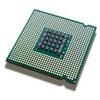Optimizing charged-particle track reconstruction algorithms is crucial for efficient event reconstruction in Large Hadron Collider (LHC) experiments due to their significant computational demands. Existing track reconstruction algorithms have been adapted to run on massively parallel coprocessors, such as graphics processing units (GPUs), to reduce processing time. Nevertheless, challenges remain in fully harnessing the computational capacity of coprocessors in a scalable and non-disruptive manner. This paper proposes an inference-as-a-service approach for particle tracking in high energy physics experiments. To evaluate the efficacy of this approach, two distinct tracking algorithms are tested: Patatrack, a rule-based algorithm, and Exa$.$TrkX, a machine learning-based algorithm. The as-a-service implementations show enhanced GPU utilization and can process requests from multiple CPU cores concurrently without increasing per-request latency. The impact of data transfer is minimal and insignificant compared to running on local coprocessors. This approach greatly improves the computational efficiency of charged particle tracking, providing a solution to the computing challenges anticipated in the High-Luminosity LHC era.
翻译:暂无翻译



